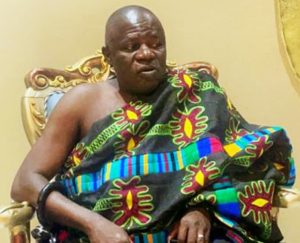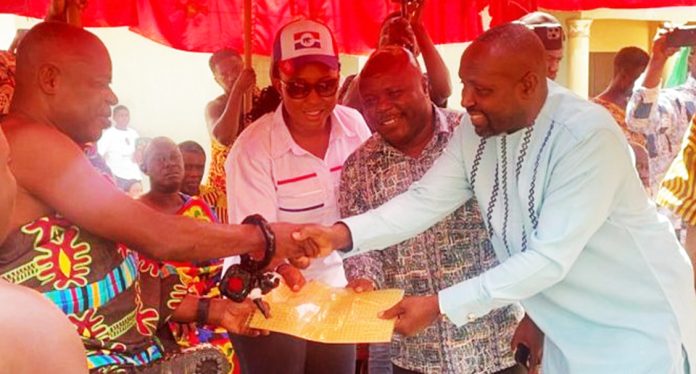The government has officially handed over the 13,000-acre Ejura Farmlands to the Ejura Traditional Council, ending years of contention over the ownership of the land.
The symbolic ceremony was facilitated by Mr. John Boadu, the Director-General of the State Interest Governance Authority (SIGA) in collaboration with the Minister of Public Enterprises, Mr. Joseph Cudjoe.

The land, which was leased to a private American company until 2018, was managed by the government after the lease expired. According to John Boadu, the President accepted the Executive approval for the de-leasing of Ejura Farmlands Company Limited from an approved cabinet memorandum of the sale of assets of about 17 defunct entities, which paved the way for the return of Ejura Farmland to its rightful owners.
Mr. Boadu disclosed that the lease agreement between the Ejura Traditional Authority and the American investor involved in the Ejura Farm Company expired in 2018.
He noted that upon the expiration of the agreement, ownership of the land had to be reverted to the Ejura Stool land following a petition by the Chief of Ejura, Barima Osei Hwedie II to consider de-leasing the land from the divestiture and restore ownership to the Ejura Stool.
He indicated that SIGA working under the Private Enterprise Ministry recommended the de-leasing of the land in approval of the President’s recommendations resulting in de-leasing of the land on November 19, 2024.
Barima Osei Hwedie II, the Chief of Ejura, expressed his profound gratitude to President Nana Addo Dankwah Akufo-Addo for de-leasing the Ejura Farmlands to the Stool as the rightful owners after the expiration of the lease.
According to him, the Traditional Authority feels elated for the decision, which ends efforts in vain by the Ministry of Food and Agriculture to privatize the property.
According to him, following multiple legal and administrative processes, the Traditional Council succeeded in proving their claim of ownership to the land when the Ministry failed to produce documentation to establish government ownership after the expiration of the lease.
He said President Akufo-Addo subsequently instructed the removal of the property from the divestiture list, paving the way for its return to the Traditional Council.
Barima Osei Hwedie II recounted the challenges his council faced in reclaiming the land, including instances of unfair treatment regarding the rent of machines and revenues mobilized from the land by the Food and Agriculture Ministry and non-payment of royalties to the traditional Authorities.
He expressed gratitude to the elders of Ejura for their support throughout the legal battle.
The Ejurahene pledged to ensure that the reclaimed land had been used to benefit the people of Ejura and Ghanaians as a whole, emphasizing that the release of the land signifies a new beginning for the community’s agricultural and economic development.








